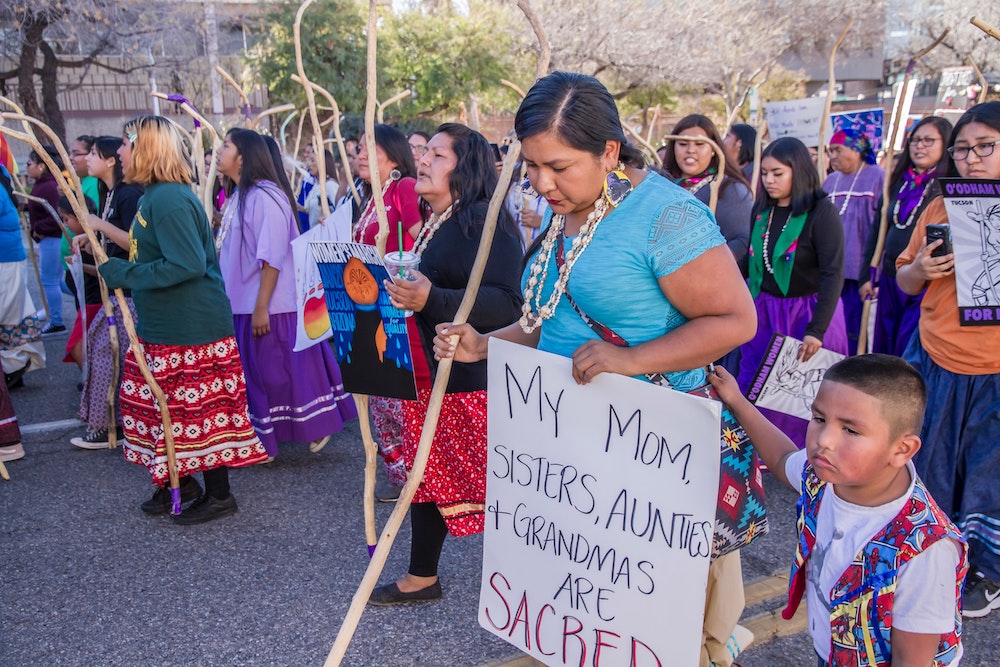Photo by Dulcey Lima on Unsplash
In recent years, IFFP has had occasion to reflect on Indigenous People’s Day, which occurs on the day many know as Columbus Day. IFFP’s racial justice group has encouraged the community to consider these questions raised on this day. This blog is built on a reflection I gave at an IFFP gathering in 2019.
We can use Indigenous People’s Day as an opportunity to think about the systematic ill-treatment of our fellow human beings by individuals, but mostly by institutional structures. And, unfortunately, Indigenous People’s Day gives us a chance to pause and reflect on some pretty awful treatment which we experience even today. And because we are IFFP, we also often observe St. Francis’s Feast Day on the Sunday closest to it, so we’re thinking about St. Francis at the same time we are thinking about Indigenous People’s Day. St. Francis is a great guidepost because—although as far as I can tell we don’t know what he thought about racism—he did believe the whole family of creation deserves more respect and ought to be invited to praise God along with us human beings.
So, why do we look at Indigenous People’s Day—why is it observed on the day that many observe as Columbus Day? It seems that, around the time of the 500th anniversary of Columbus’s arrival in 1992, people wanted to take another look at Columbus’ legacy. And about 20 years after that, a great many Christian denominations began to formally renounce the Doctrine of Discovery.
Traditionally, at least when I was in school in the 1970s, we said Columbus “discovered” America. But we all know he didn’t “discover” it—there were millions of people living here when he arrived. And this is a tragic part of the story we remember on this day, because the Doctrine of Discovery was unfortunately articulated and formalized by the Pope, the leader of Catholicism, around the same time Columbus was setting forth from Spain. The doctrine was used as a justification to say that native people did not count as people at all, and justified harming them, which is something that unfortunately many Europeans felt, and still feel today, about people whose skin color did not match their own.
There is also something else very important about 1492 in Spain. Although previous to this time Spain was well-known for Christians, Muslims and Jews living together in harmony, the Spanish monarchy had begun the Spanish Inquisition. They began to force Jews and Muslims to convert to Christianity. And a few months before Columbus set sail, the Spanish government decided to expel any Jewish person who had not converted. More than 200,000 people were evicted, in many cases violently, after about 100 years of peaceful co-existence. As a result, some scholars believe a number of Jewish people were among Columbus’ crew, and his translator was a Jewish person who was forced to convert to keep his life.
Once Columbus arrived on this continent native people suffered very much. Some estimates are that 50 million native people lived here just before European arrival and perhaps less than 1 million remained only fifty years later and the newly-created United States forcibly removed native people from 1.5 billion square miles of land.
So this can leave us feeling a little bleak and maybe guilty, particularly those of us who are of white European heritage. But we do have at least one hero to look up to in this time—his name was Bartolome´ de las Casas. While Las Casas came to North America originally as a conquistador, he was confronted by Dominican monks decrying the terrible treatment of native people who were being enslaved. Las Casas is somewhat like St. Francis in that he rejected his previous way of life and took on a new mantle of justice. Las Casas eventually became a priest and became an advocate against slavery and for humane treatment of all people. He used the Bible to fight against injustice. He travelled to Spain and spent decades seeking meetings with the king and was eventually appointed a protector of the Indigenous people. He advocated for a more simple form of agriculture that would not rely on large swaths of human beings to provide labor. He was, for the most part, not successful, and he was misguided in his early advocacy thinking that Africans should replace Indians as slaves (although recent scholarship indicates he realized his error as he learned that the African slave trade was just a cruel and the African people just as deserving of humane treatment). He spoke out against the dehumanizing slavery of North American for the rest of his life. And some scholars believe that de las Casas came from Jewish heritage although he lived his life as a Christian.
So while sometimes we excuse people for their behavior in the past, saying things like “they didn’t know any better,” the truth is that in the 1540s we have a hero who recognized that the teachings of Christianity could not be reconciled with enslavement and abuse—hundreds of years before the start of the United States, let alone of the abolitionists.
So on the day when many of our calendars say “Columbus Day” I encourage you to think about the indigenous people who lived on this land long before any other people came and to take courage from the story of Las Casas—some people fight against systemic injustice even when almost no one else thinks twice about it. And we can do the same today.

